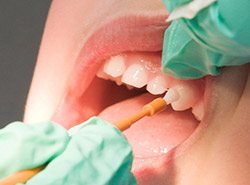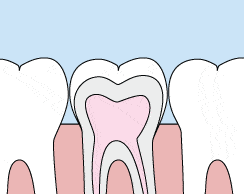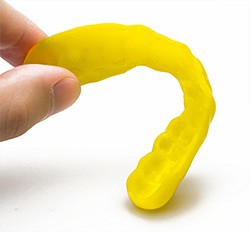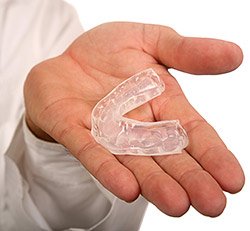Preventive Dentistry – Wellesley, MA
Identifying & Treating Oral Health Problems Early
The bread and butter of preventive dentistry is identifying and treating oral health problems early. We offer a wide variety of preventive care and instruction to help our patients maintain healthy and beautiful smiles for life. From routine checkups to custom-made mouthguards, we offer high quality care for patients of all ages. If you haven’t been to the dentist in six months or more, give us a call today to schedule your next appointment.
Dental Checkups & Teeth Cleanings

Practicing good oral hygiene means maintaining your smile by visiting the dentist regularly and taking care of your teeth and gums between checkups. Our practice wants to make sure that you get the most out of your office visits, and that your teeth stay healthy for life! We'll work with you to provide complete dental care, and show you how to maintain your smile at home with the right dental products for you and your family. During your regular checkup, your hygienist will:
- Check for any dental problems that you may not see or feel
- Look for cavities or any other signs of tooth decay
- Inspect your teeth and gums for gingivitis and signs of periodontal disease
- Provide a thorough teeth cleaning, rinse, and polish
Visiting the dentist every six months gives you the chance to talk with your doctor and receive answers for any questions you may have about your oral health. Checkups are also a great way for you to find out about new treatments that may benefit your smile.
Fluoride Treatments

Fluoride is effective in preventing cavities, tooth decay, and plaque buildup on the tooth’s surface. A fluoride treatment in your dentist’s office takes just a few minutes. After the treatment, patients may be asked not to rinse, eat, or drink for at least 30 minutes in order to allow the teeth to absorb the fluoride. Depending on your oral health or your doctor’s recommendation, you may be required to have a fluoride treatment every three, six, or 12 months.
Dental Sealants

Sometimes brushing is not enough, especially when it comes to those hard-to-reach spots in your mouth. It is difficult for your toothbrush to get in-between the small cracks and grooves on your teeth. If left alone, those tiny areas can develop tooth decay. Sealants give your teeth extra protection against decay and help prevent cavities.
Dental sealants are plastic resins that bond and harden in the deep grooves on your tooth’s surface. When a tooth is sealed, the tiny grooves become smooth and are less likely to harbor plaque. With sealants, brushing your teeth becomes easier and more effective against tooth decay.
Sealants are typically applied to children’s teeth as a preventive measure against tooth decay after the permanent teeth have erupted. However, adults can also receive sealants on healthy teeth. It is more common to seal “permanent” teeth rather than “baby” teeth, but every patient has unique needs, and your dentist will recommend sealants on a case-by-case basis.
Sealants last from three to five years, but it is fairly common to see adults with sealants still intact from their childhood. A dental sealant only provides protection when it is fully intact, so if your sealants come off, let your dentist know, and schedule an appointment for your teeth to be re-sealed.
Mouthguards

Whether you wear braces or not, protecting your smile while playing sports is essential. Mouthguards help protect your teeth and gums from injury. If you participate in any kind of full-contact sport, the American Dental Association recommends that you wear a mouthguard. Choosing the right mouthguard is essential. There are three basic types of mouthguards: the pre-made mouthguard, the “boil-and-bite” fitted mouthguard, and a custom-made mouthguard from your dentist. When you choose a mouthguard, be sure to pick one that is tear-resistant, comfortable and well-fitted for your mouth, easy to keep clean, and does not prevent you from breathing properly. Your dentist can show you how to wear a mouthguard properly and how to choose the right mouthguard to protect your smile.
Nightguards

If you often wake up with jaw pain, earaches, or headaches, or if you find yourself clenching or grinding your teeth, you may have a common condition called “bruxism.” Many people do not even know that they grind their teeth, as it often occurs when one is sleeping. If not corrected, bruxism can lead to broken teeth, cracked teeth, or even tooth loss.
There is an easy, non-invasive treatment for bruxism: nightguards. Nightguards are an easy way to prevent the wear and damage that teeth-grinding causes over time. Custom-made by your dentist from soft material to fit your teeth, a nightguard is inserted over your top or bottom arch and prevents contact with the opposing teeth.
Oral Health & Diabetes

Did you know that diabetes can significantly impact the health of your gums, teeth, and mouth? Research suggests that people with diabetes are at higher risk for oral health problems including:
GINGIVITIS
Diabetes can weaken the immune system, which leaves the mouth vulnerable to infections like gingivitis. Gingivitis is an early stage of gum disease that causes irritation, swelling, and bleeding in your gums. This can lead to a more serious form of gum disease called periodontitis. When you have gum disease, germs work to destroy your gums (gingiva) and the bone around your teeth. If you don’t clean plaque and tartar away, even gentle brushing can cause your gums to bleed. This is called gingivitis.
PERIODONTITIS
If your blood sugar levels are too high, you are more likely to develop serious gum disease if you have diabetes. This is because you are more likely to get a bacterial infection and have a harder time fighting the bacteria in your gums. If nothing is done, the infection goes on to destroy the bone around your teeth and your teeth may start to move or become loose. When this happens, you may need surgery to save your teeth.
Like all infections, gum disease may be a factor in causing blood sugar to rise and may make diabetes harder to manage and more difficult for your body to fight the infection.
THRUSH
Another oral problem associated with diabetes is thrush. Thrush is an infection caused by fungus that grows in your mouth. To control thrush, keep managing your diabetes and if you smoke, quit. Call 1-800-Quit-Now/800-784-8669 for information on how to stop. If you wear dentures, remove and clean them daily.
DRY MOUTH
You may notice that you have a dry mouth at times, especially if you have diabetes. This may be caused by medicines you take or by blood sugar levels that are high. A dry mouth can increase your risk of cavities because there is less saliva to wash away germs and take care of the acids they create. Dry mouth can also lead to other problems, such as salivary gland infections.
If you have dry mouth, try drinking more water, chewing sugar- free gum, or eating sugar-free candy to help keep the saliva flowing. Some people use saliva substitutes, available at drugstores. Managing your diabetes can also help you prevent or relieve dry mouth caused by diabetes.
STEPS YOU CAN TAKE TO AVOID ORAL HEALTH PROBLEMS INCLUDE:
- Managing your blood sugar (also called blood glucose).
- Brushing and flossing properly to control plaque (a sticky film of food, saliva, and germs that forms on teeth and dentures).
- Seeing your dentist for regular checkups. Your dentist will tell you how often checkups are needed.
- Visiting diabetes.org or call 800-DIABETES (800-342-2383) for more resources from the American Diabetes Association
